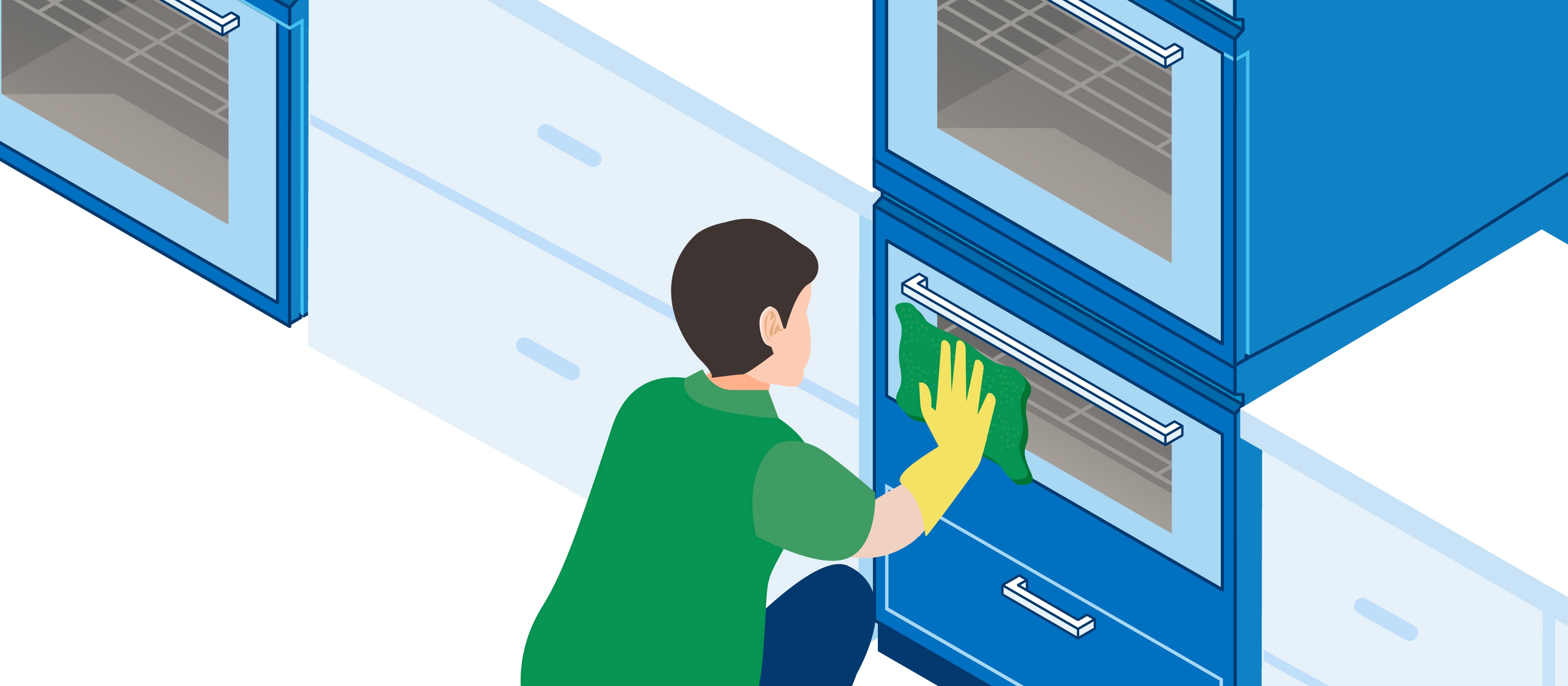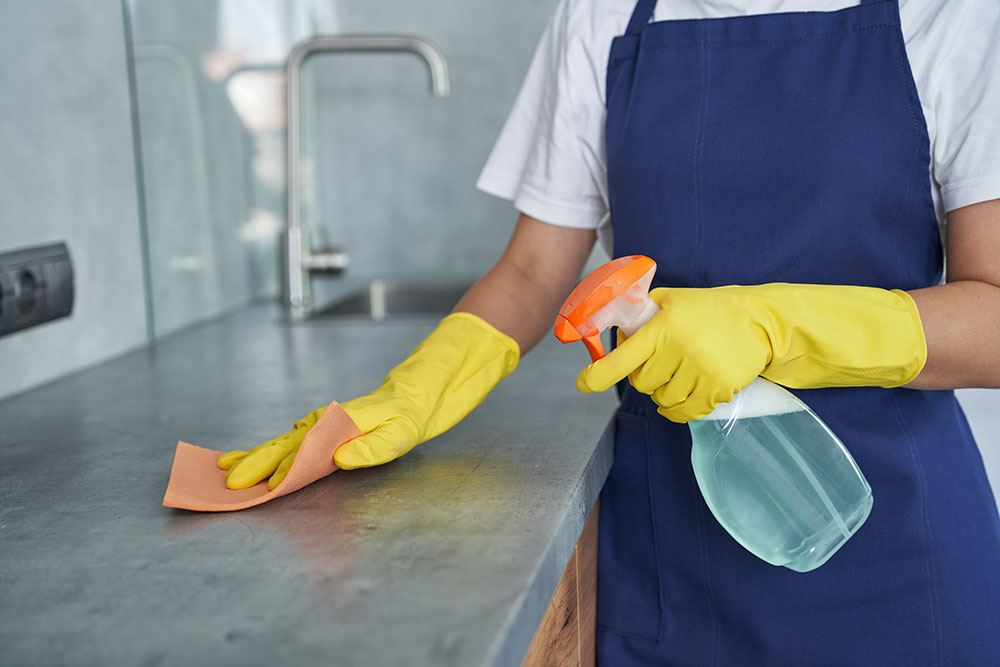Have you ever wondered how often your commercial kitchen should undergo a deep cleaning? If you’re in charge of a bustling restaurant or a busy catering service, this is a crucial question.
A clean kitchen is essential not just for hygiene, but also for safety and efficiency. Dirt and grease buildup can lead to health code violations, unhappy customers, and even accidents. In this blog, you’ll discover the secret formula to keeping your kitchen spotless, ensuring you meet all health standards and keep your operations running smoothly.
Stick around to learn how regular deep cleaning can transform your business and safeguard your reputation.
Importance Of Deep Cleaning
Deep cleaning a commercial kitchen is more than just a routine chore; it’s a vital part of maintaining a safe and efficient cooking environment. Neglecting this essential task can lead to compromised hygiene, unsafe food handling, and even costly health code violations. As someone who once managed a bustling restaurant kitchen, I learned that regular deep cleaning is the backbone of a well-functioning kitchen. But how often should you roll up your sleeves and dive into this task?
Importance Of Hygiene
Maintaining a spotless kitchen is crucial for ensuring food safety. Harmful bacteria and mold can thrive in neglected corners and surfaces. By deep cleaning, you minimize the risk of foodborne illnesses and keep your customers safe. Think about the peace of mind knowing your kitchen is a haven for healthy food preparation.
Preventing Equipment Malfunctions
Grease and grime can build up over time, causing equipment to work inefficiently or break down. Regular deep cleaning helps keep appliances in top shape, preventing costly repairs or replacements. Imagine reducing unexpected downtime simply by dedicating time to thorough cleaning.
Enhancing Staff Productivity
A clean kitchen boosts morale and productivity. When your staff can work in a clean environment, they focus better on their tasks. The positive impact on their efficiency is undeniable. Have you noticed how a clean workspace makes tasks feel less daunting?
Meeting Health Regulations
Compliance with health codes is non-negotiable in the food industry. Deep cleaning ensures you meet these standards, avoiding penalties and shutdowns. Staying on top of these requirements can save you from unnecessary stress and financial losses. Are you confident your kitchen would pass a surprise inspection?
Customer Perception
First impressions matter. A clean kitchen reflects the quality and care you put into your food. Customers appreciate establishments that prioritize cleanliness, which can lead to repeat business. Isn’t it rewarding when patrons recognize your commitment to excellence?
Deep cleaning is not just about aesthetics; it’s a strategic move to safeguard your business. By setting a regular schedule, you can ensure your kitchen remains a trusted and efficient space. So, how often should your commercial kitchen undergo a deep cleaning? It may depend on the volume of business and specific operations, but prioritizing this task will always pay off in the long run.

Credit: www.sparklymaidmiami.com
Factors Influencing Cleaning Frequency
The frequency of deep cleaning a commercial kitchen depends on several factors. The type of food prepared, kitchen size, and staff training play crucial roles. Regular inspections and health standards guide cleaning schedules to ensure safety and hygiene.
A spotless commercial kitchen is essential for food safety and customer satisfaction. But how often should these kitchens be deep cleaned? The answer isn’t one-size-fits-all. Various factors influence cleaning frequency. Dive into the details to see what works best for your kitchen.Type Of Food Service
The kind of food you serve impacts how often you need a deep clean. A fast-food restaurant with greasy fryers might require more frequent cleaning than a café serving cold sandwiches. If you run a bakery, flour dust can be a constant challenge. Each type of service has unique cleaning needs. Consider what residues or messes your menu items might leave behind.Volume Of Customers
Customer volume plays a big role in determining cleaning schedules. A bustling diner with a high turnover of tables could see more spills and messes. Think about the last time your restaurant was packed and you struggled to keep up. More customers mean more potential for dirt and grime. An empty dining room won’t have the same cleaning needs as a fully booked one.Regulatory Requirements
Health and safety regulations often dictate cleaning routines. Local health departments may have specific guidelines for your area. Ever faced a surprise inspection? It can be a wake-up call to tighten your cleaning schedule. Make sure you’re aware of these rules. Staying compliant not only avoids fines but also ensures a safe dining experience for your customers. In short, consider what your kitchen needs. Is the grill used daily, or is the salad bar your main attraction? Reflect on your busiest days and the specific messes your food service creates. Regular deep cleaning is crucial, but tailoring the frequency to your kitchen’s unique demands makes all the difference. What steps will you take to refine your cleaning schedule today?Key Areas For Deep Cleaning
Commercial kitchens need deep cleaning at least every three months. Focus areas include ovens, exhaust systems, and refrigeration units. Regular cleaning keeps equipment safe and efficient.
Deep cleaning is vital for maintaining a safe commercial kitchen. It helps prevent contamination and ensures compliance with health regulations. Key areas require focused attention during deep cleaning. Here are the essential spots in your kitchen to address regularly.Kitchen Equipment
Kitchen equipment accumulates grease and food residue. Ovens, grills, and fryers need regular deep cleaning. It prolongs their lifespan and enhances performance. Clean equipment ensures food safety and quality.Ventilation Systems
Ventilation systems remove airborne grease and odors. Over time, they collect dust and grease. Regular cleaning prevents fire hazards and improves air quality. It also maintains efficient airflow in the kitchen.Food Preparation Surfaces
Food preparation surfaces are prone to bacteria build-up. Deep cleaning removes hidden germs and dirt. It prevents cross-contamination. Clean surfaces ensure safe food handling and preparation.Storage Areas
Storage areas house ingredients and supplies. Dust, spills, and expired items can accumulate. Regular cleaning keeps areas organized and hygienic. It prevents spoilage and ensures proper inventory management. Deep cleaning these key areas boosts kitchen safety and hygiene. Regular maintenance of each spot is essential. Prioritize these areas for a healthier kitchen environment.Signs A Kitchen Needs Deep Cleaning
Commercial kitchens face heavy usage. Over time, they gather dirt and grime. Regular cleaning helps, but sometimes deeper cleaning is needed. Knowing the signs can help maintain hygiene.
Visible Dirt And Grime
Dirt on surfaces is a clear sign. Sticky floors or greasy counters need attention. Cabinets and shelves should also be checked. Dirty equipment can affect food quality. Keeping a keen eye helps.
Unpleasant Odors
Bad smells often mean something’s wrong. They may come from drains or trash areas. Spoiled food can cause them too. If odors linger, deep cleaning is needed. Freshness matters in a kitchen.
Pest Infestations
Pests are a major problem. They spread diseases and contaminate food. Signs include droppings, nests, or chewed packaging. If pests appear, act fast. Deep cleaning helps remove their traces.
Best Practices For Scheduling
Maintaining a clean commercial kitchen is crucial. Scheduling deep cleaning tasks ensures hygiene and compliance with health standards. Establishing a routine for cleaning boosts efficiency and safety. It prevents the build-up of grime and bacteria. Regular cleaning helps in extending the lifespan of kitchen equipment. It saves time and reduces costly repairs.
Weekly Tasks
Weekly cleaning targets areas used daily. Clean and sanitize countertops thoroughly. Scrub sinks to remove food residues. Deep clean cooking surfaces and grills. Empty and disinfect trash bins. Sweep and mop floors to eliminate dirt. Pay attention to high-touch areas. Clean refrigerator seals and handles.
Monthly Tasks
Monthly tasks focus on areas that collect dust and grease. Clean air vents to improve air quality. Inspect and clean exhaust fans. Deep clean ovens and microwaves. Check and clean light fixtures. Empty and sanitize storage units. Clean under heavy equipment. Monthly cleaning prevents fire hazards.
Quarterly Tasks
Quarterly cleaning covers extensive areas. Inspect and descale dishwashers. Clean and sanitize freezers and refrigerators. Check for mold and mildew. Deep clean walls and ceilings. Inspect plumbing for leaks. Deep clean grease traps. Quarterly tasks ensure thorough maintenance.

Credit: www.torkglobal.com
Choosing Professional Cleaning Services
Choosing professional cleaning services for a commercial kitchen is vital. Deep cleaning ensures a hygienic, compliant environment. It also supports the longevity of kitchen equipment. The expertise of cleaning professionals can make a significant difference. Understanding how to choose the right service is crucial.
Criteria For Selection
Selecting a cleaning service requires careful consideration. First, check their experience in commercial kitchen cleaning. An established company often offers reliable service. Look for certifications and training. These indicate knowledge of industry standards. Customer reviews provide insights into their reputation. Positive feedback suggests trustworthy service. Also, verify their availability. Frequent service is essential for maintaining cleanliness.
Cost Considerations
Cost is a key factor in choosing cleaning services. Compare quotes from various providers. Ensure the quote includes all necessary tasks. A breakdown of costs helps in understanding value. Consider long-term contracts for potential discounts. Some companies offer flexible payment options. This makes budgeting easier for businesses.
Ensuring Quality
Quality assurance is crucial in professional cleaning. Regular inspections by the service provider are beneficial. These ensure adherence to cleaning standards. Ask about the cleaning methods they use. Advanced techniques can improve results. Check if they use eco-friendly products. This is important for health and environmental safety. A reliable service guarantees consistent quality over time.
Benefits Of Regular Deep Cleaning
Deep cleaning a commercial kitchen is not just a chore. It is a practice that brings multiple benefits. Regular deep cleaning ensures a safe and efficient environment. It protects both the staff and the food. This routine maintenance boosts hygiene, extends equipment lifespan, and keeps the kitchen compliant.
Enhanced Hygiene
Regular deep cleaning drastically improves kitchen cleanliness. It removes hidden dirt and food particles. This reduces the risk of foodborne illnesses. A clean kitchen promotes safe food preparation. It ensures a healthy dining experience for customers.
Prolonged Equipment Life
Cleaning extends the life of kitchen equipment. Regular maintenance prevents grease build-up. It reduces wear and tear on machines. Clean equipment operates more efficiently. This saves money on repairs and replacements.
Compliance With Health Standards
Deep cleaning helps meet health regulations. It ensures the kitchen meets safety standards. Regular cleaning avoids fines and legal issues. It builds trust with health inspectors. Compliance is crucial for business reputation.

Credit: www.icecleaning.co.uk
Frequently Asked Questions
How Often Should Deep Cleaning Occur In Kitchens?
Commercial kitchens should be deep cleaned monthly. Regular cleaning prevents health risks and maintains equipment efficiency. High-traffic kitchens may require more frequent cleaning. Assess the kitchen’s usage and adjust the schedule accordingly. A consistent deep cleaning routine ensures a safe and sanitary environment for staff and patrons.
What Areas Need Frequent Deep Cleaning?
Areas like exhaust systems, floors, and kitchen equipment need frequent deep cleaning. These areas accumulate grease and debris quickly. Regular attention prevents fire hazards and ensures compliance with health standards. Prioritize high-contact surfaces to maintain hygiene. Proper scheduling and staff training are crucial for effective cleaning.
Why Is Deep Cleaning Essential For Kitchens?
Deep cleaning is vital for health, safety, and efficiency. It removes hidden dirt and bacteria, preventing contamination. Regular cleaning maintains equipment performance and extends its lifespan. It also ensures compliance with health regulations, reducing the risk of fines. A clean kitchen boosts staff morale and customer satisfaction.
What Are Common Deep Cleaning Challenges?
Common challenges include reaching difficult areas and managing time efficiently. Grease buildup and stubborn stains require specialized cleaning products. Training staff on proper techniques is essential. Scheduling cleaning during non-peak hours minimizes disruptions. Regular inspection helps identify problem areas and improve cleaning processes.
Conclusion
Regular deep cleaning keeps a kitchen safe and efficient. It’s crucial. Clean every corner, not just visible areas. This prevents bacteria build-up. A clean kitchen boosts staff morale. It ensures food safety and compliance. Schedule deep cleaning monthly or quarterly.
Consider kitchen size and usage. Busy kitchens may need it more often. Consistent cleaning protects equipment. It extends its lifespan. Keeps operations smooth. Prioritize hygiene for customer satisfaction. A clean kitchen builds trust. It attracts more clients. Regular cleaning saves money long-term.
Avoid costly repairs and fines. A clean kitchen is a happy kitchen. Staff and customers appreciate it.

As the chief content writer, Hassan Al Sarker works as a professional kitchen-based content creator at Kitchen Liker.
In addition to reviewing the content published on Kitchen Liker, he ensures that it is accurate, relevant, and helpful. As a result, all the reviews and information published at Kitchen Liker are neutral and userfriendly.
Hassan Al Sarker has a bachelor’s degree in Hotel and Tourism Management From the Newyork University. Before joining Kitchen Liker, he was a contributor at Kitchen Club, United States.
